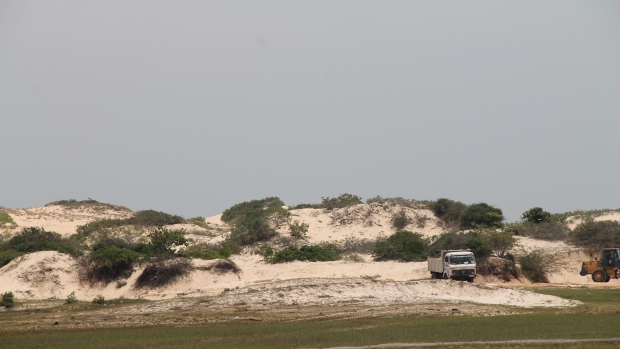Grants :: Small Grant Facilities :: Participatory Conservation of the Casuarina Forest Belt in Manalkadu Sand Dunes
Participatory Conservation of the Casuarina Forest Belt in Manalkadu Sand Dunes

Manalkadu sand dunes, Manalkadu © Kumudini Ekaratne, IUCN, 2014
Objectives
- 375 families are mobilized in Manalkadu to protect the forest belt and manage the forest resources in a sustainable way
- Community awareness increased through education on forest conservation, management and conservation of nature
- Reconstruct social capital within the communities of GN Divisions J/418 and J/419
Background
Foresting of Manalkadu sand dunes with Casuarina was started around 1976 by the Forest Department and was abandoned due to the escalation of the conflict. Different actors continued planting and presently about 1,500 acres of neglected forest survives over a stretch of about 08 kilometers and is being subject to wanton distraction and vulnerable to forest fires.
Fisheries is the only livelihood for those living in the neighborhood of the sand dunes and forest. Fishing was prohibited due to security reasons and the community lost its livelihood. They were displaced many times over, lost all their belongings and are now resettled. Manalkadu was severely ravaged by the Tsunami 2004 and the families relocated in new homes. The community has just begun to restructure their lives after the end of three decades of armed conflict.
The project aims at forming a Forest User Group within the Rural Development Societies coming within the forest belt with the support of Department of Forest, Provincial Ministry of Agriculture & Environment and non-state actors linked to it with community participation for its protection and expansion.
Activities:
Result # 1:Formation of a Forest User Group within the Rural Development Society (FUG-RDS) of Gramaseva Divisions J/418 & J419
- Key Informant Interviews, Focus Group Discussions, Community Mobilization meetings, and informal meeting with stakeholders
- Submission of information and data available and outline for the formation of FUG-RDS and Operational Plan for discussion and comments
- Formation of FUG-RDS and election of office bearers. Development of constitution in consultation with subject matter specialist (DoF, MoA Province) Legal advisers etc ratification and registration
- Scheduling and application of Operational Plan. Conducting workshop for identifying and analysing key elements of the objective oriented activities
Result # 2 –Community awareness and education on forest conservation, management and conservation of nature
- Community education on forest management. Preparation and printing brochures, hand outs and banners
- Sensitization programs, distribution of printed brochures, propagandas to reach the messages to the wider communities through school children
Result # 3 – Reconstruct Social Capital
- Reactivation of traditional civil society organizations (RDSs, WRDSs, CBOs, Religious based organizations
- Training on Leadership, conflict resolution, team spirit, Gender equity
- Exposure visits
Target beneficiaries
375 families living in Manalkadu.
Outputs
1. Forest User Group within the Rural Development Society (FUG-RDS) and an Operational Plan
2. Educational material on forestry management
3. Reactivation of traditional civil society organizations (RDSs, WRDSs, CBOs, Religious based organizations
Accomplishments and challenges
- 375 families are mobilized in Manalkadu to protect the forest belt and manage the forest resources in a sustainable way.
- Community awareness increased through education on forest conservation, management and conservation of nature.
- Forest User Group within the Rural Development Society (FUG-RDS) in place with an Operational Plan
- Men and women trained on leadership, conflict resolution, team spirit and gender equity to empower them in order to take management and leadership roles in the conservation of forest
Contributions to cross-cutting themes
The project will greatly influence the micro environment and contribute to the greening of the sand dunes and preserve the shallow fresh water source. Gender equity will be ensured at all levels.
Lessons Learned
1. Project should start with PRA and allow the beneficiaries to understand the activities.
2. All stakeholders should participate in a timely manner
Project Facts
Country
Location
Manalkadu
Topic
Duration
1st Sep 2014 to 30th Jun 2015
MFF Grant Amount
Rs 1,462,500
Co-financing Partner
Partner: LKR 17,000 (Ministry of Agriculture, Agrarian Services, Animal Husbandry & Environment, Northern Province)
Grantee: LKR 251,000
.